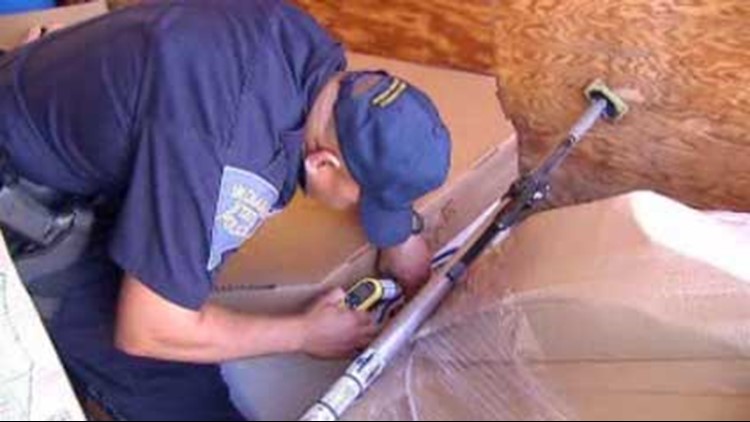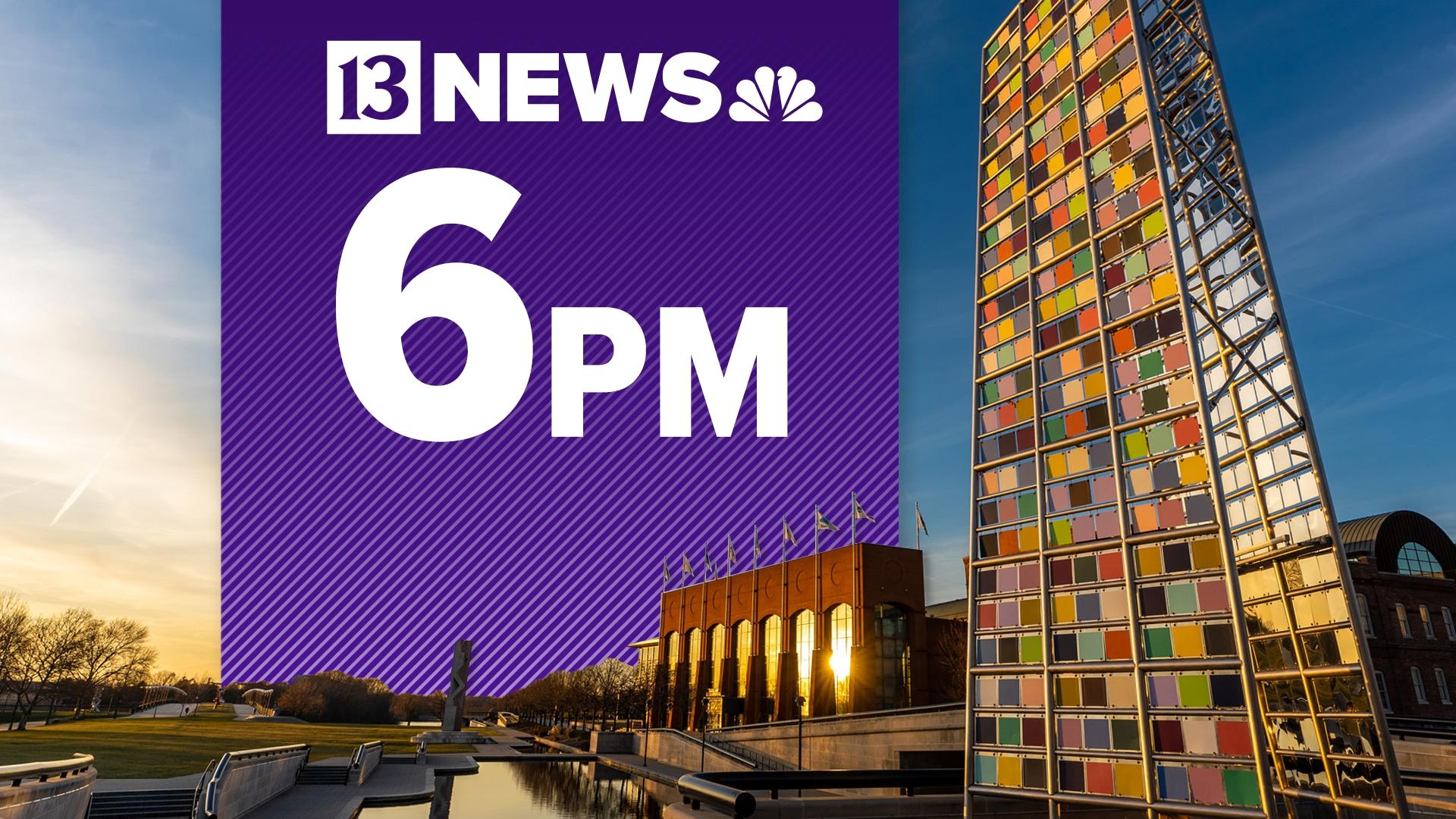INDIANAPOLIS - If you think state police are just looking for speeders, think again. All across Indiana, state troopers are now cracking down on a dangerous problem that impacts local grocery stores and restaurants, and it can make you and your family very sick. 13 Investigates shows you the threat rolling into town every day, and why police say it's "totally disgusting."
State Trooper Ashley Hart wrinkles her nose, closes her eyes and shakes her head as she walks away from a white box truck pulled over in Tippecanoe County.
"Disgusting," she says. "Totally disgusting."
The truck is loaded with chicken, beef, tofu and vegetables headed for Chinese restaurants in Lafayette and Kokomo, and its refrigeration unit is not working properly.
The temperature outside is 92 degrees. The heat index makes it feel like 103.
The temperature inside the truck is rising quickly.
"When I opened the [truck] door, I immediately saw flies and we were overcome by the strong odor of rotten food," Hart says. "It's very dangerous."
For the past two months, 13 Investigates has accompanied Hart and other Indiana State Troopers as they've patrolled for "hot trucks." The trucks violate state law by transporting perishable food at potentially unsafe temperatures, and they are headed to grocery stores and restaurants throughout Indiana.
Every day
State police say thousands of food trucks travel through Indiana every day, and most carry food safely.
But months of patrolling reveals an alarming number of food trucks that do not follow the rules, according to ISP Sgt. Rich Kelly.
"Lately we've seen something just about every day," he said. "We find vehicles that don't have any refrigeration at all. We find some where the refrigeration unit is not working properly. When we're talking summertime temperatures and food that's not refrigerated … it's a situation that can affect thousands of people."
Under Indiana state code, perishable foods that require refrigeration must be maintained at or below 41 degrees to prevent the growth of dangerous bacteria such as salmonella and listeria, which can cause illness or even death.
Young children, seniors, pregnant women and those with compromised immune systems are especially at risk, according to Tippecanoe County environmental health specialist Craig Rich.
"Food borne illness is something you don't want to mess with. We would see diarrhea, fever, abdominal cramps. Until you seek medical aid, you just continue to get sick," Rich explained. "And it's kind of hard tracking some of these food borne illnesses because you don't get sick right away. That's why we want to see cold food below 41 [degrees] to keep it out of the danger zone."
Recent traffic stops by Trooper Hart along I-65 show some trucks far exceed the 41-degree requirement.
"Gross and unacceptable"
In mid-June, Hart discovered an unrefrigerated truck carrying dairy products and raw sausage to Hispanic grocery stores in Lafayette, Indianapolis and Fairfield, Ohio. She contacted the Tippecanoe County Health Department for a more thorough inspection. Health inspectors ordered all perishable food items on the truck – more than 5200 pounds of yogurt, sour cream, milk, cheese and chorizo sausage – to be destroyed after the food registered above 41 degrees.
On the Fourth of July, Hart stopped a truck transporting perishable food to five restaurants in Indianapolis. According to the state trooper, the truck's refrigeration unit was not working properly and an internal temperature gauge in the truck registered 96.3 degrees. As a result, raw chicken, bean sprouts and eggs all tested between 57 and 67 degrees when sampled by health inspectors. They condemned the load, ordering all perishable items to be thrown away.
Last week, Hart again found a hot truck – this time transporting food to the Chinese restaurants in Lafayette and Kokomo. After inspecting the load and measuring temperatures of the chicken, beef, tofu and vegetables, health inspectors declared it "gross" and "unacceptable" and took the spoiled items to the county landfill.
All of the trucks were coming from distributors in Chicago.
All were headed to Indiana on sweltering hot days.
All were headed to restaurants and grocery stores – and would have made it if it weren't for safety inspections by Indiana State Police.
"It's very possible people could have gotten sick," Rich said. "It's proven chicken out of temperature is going to give you salmonella. To have that transported at that high of a temperature is almost guaranteed to get someone sick."
Patrols pay off
That's why, during the summer, ISP is on the lookout for hot trucks all over the state.
"We don't want someone to get sick or possibly die from a situation that could have been corrected by us on the road," Kelly said.
Sometimes, hot trucks lead inspectors to even bigger problems.
That's what happened when state police stopped a truck last summer from DW Trading Company.
Inspection reports show the truck had five tons of unrefrigerated food at unsafe temperatures. It was all destroyed. Inspectors then went to the company's Indianapolis warehouse, a west-side processing plant and distribution center for Chinese food markets and restaurants around the state.
According to a U.S. Food and Drug Administration warning letter, inspectors discovered some food in the DW Trading Company warehouse was contaminated by bird droppings and insects. They cited the facility for black mold, cockroaches and a "mouse-like animal" running through the warehouse. Following the safety violations, DW Trading is now shut down.
This summer, ISP patrols are already responsible for stopping hot trucks across the state, resulting in tons of dangerous food heading to landfills instead of dinner plates.
Several of those hot trucks cited by ISP and health inspectors are from Lucky Truck Rental in Chicago. The company operates and maintains trucks for A1 Food Service, which supplies food to many Asian restaurants in central and northern Indiana.
"We have ten trucks, and they are checked every night," a Lucky Truck Rental employee told Eyewitness News. Asked about the trucks recently cited by state troopers, the Lucky Truck Rental worker responded "we fixed it already."
Banner Wholesale Grocers, which lost 5200 pounds of confiscated food items last month during an ISP safety check, blamed state troopers for ruining the load.
"The product was at the proper temperature when stopped, but they left the doors open, opened the container ... for three hours in the heat," said company spokesman Irwin Friedman, who said some of the food was stored in insulated containers. "It was an isolated incident. You can't leave the door open on your refrigerator and expect it to keep your food cold. That's what happened, they opened the door and left it open."
State police disagree.
"I would expect a company to reply in that manner to try to defend the improper way they transport their product," said Sgt. Kelly. "To haul refrigerated product in an unrefrigerated unit from Chicago to Indianapolis is a decision they made. The truck was not left open while waiting to take an initial temperature, and I was on the scene within roughly ten minutes of the traffic stop. My first reading [sour cream] was in the 60s."
Since heightened patrols began in June, some food truck haulers tell WTHR they are aware of ISP's increased attention on food safety.
"Word is getting out and that's good," Sgt. Kelly said. "We want them to know we're out there and we're looking."
But not all stops end they way state troopers expect. In some situations, health inspectors side with the trucking companies.
Hot or not-so-hot?
Earlier this month, ISP pulled over a truck carrying thousands of pounds of seafood, beef, chicken and pork to grocery stores in Indianapolis. Some of the items were supposed to be frozen, but the driver told WTHR his truck's refrigeration unit was malfunctioning.
"The truck's not working good," said Marco Bundoc, a driver for El Rey USA Meats. "It's not coming down to 30 [degrees]. It's staying 40."
State Troopers expressed concerned not only about the truck's temperature, but also its sanitation. Whole butchered hogs were loaded inside the truck, under and on top of boxes containing fish, beef and chicken. Some of the hogs were wrapped in plastic and some were not.
"There's one carcass that's just laying on a wood palette, and when it's laying basically on the floor, that concerns me," Kelly said. "You see fluids dripping into other boxes and things like that ... it's disgusting."
ISP also found the truck had bad brakes, and it took hours to get them fixed.
Eventually, both the brakes and refrigeration unit were repaired. (Bundoc said he got the refrigeration unit to work properly by hitting it with a hammer.)
Health inspectors from both the Boone County and Marion County health departments inspected the load and determined the meat was still cold enough to be safe. They also decided sanitation on the truck did not violate state or federal law.
"When you see something like that, there's definitely a gross-out factor, but when it comes to an actual violation, that's a harder call," said Boone County environmental health specialist Sharon Pattee.
More than ten hours after leaving Chicago, the truck pulled up to the Tienda Morelos grocery store on the east side of Indianapolis and delivered its first load with approval from the health department.
"We did not cite the distributor or have any food discarded because it did not present a public health risk," said John Althardt, public relations coordinator at the Marion County Health Department.
Staff from the grocery store double-checked the temperature of the delivery and determined all of the meat was 40 degrees or below.
"I don't know what happened this morning, but that's good now," Bundoc said, holding up a box full of frozen steak. "It's OK."
In response to criticism about the incident, El Rey president Daniel Leon sent WTHR a statement, reiterating that his company's delivered products are safe.
Out of reach
Whether a truckload of food is safe or a serious health risk on wheels is often difficult to determine without a stop by state police.
State Troopers are allowed to pull over food trucks. Health inspectors cannot. Local health departments have no authority to stop food trucks on their own. As a result, many hot trucks slip through the cracks unnoticed.
"They are a really big concern because, for the most part, it's out of our reach," said Rich. "A truck like that, it's kind of a rolling restaurant … they have to follow the same rules, but we can't stop them."
Health inspectors believe high gas prices are making matters worse. Refrigeration units on food trucks require lots of fuel to operate, and turning the units off during transport can result in huge savings for truck drivers – with little risk. Turning the refrigeration unit back on for just the last 40 minutes of a long haul can bring warm food items down to legally-required temperatures in time for delivery, according to Boone County environmental health specialist Dave Drinan.
"The sad part is that no one is assured how much time and temperature abuse this product has gone through since the time it left the processing plant until it arrives by truck at the retail restaurant," he wrote.
State Police admit they cannot stop nearly as many food trucks as they'd like. Health inspectors cannot stop them at all. The bottom line: most food trucks simply don't get inspected for food safety.
"You may stop one of those trucks. There could be hundreds out there we're missing," said Kelly. "We rely on all these people to haul these products safely and within guidelines and we're not seeing that. You just don't want to see someone get hurt."



